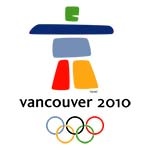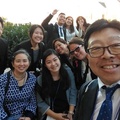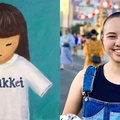The Vancouver Olympics have come and gone. Every two years, our global attention and hearts are captured by athletes who compete for their nations.
I love watching the Olympics. It’s not just about who ends up on the podium and medal counts. It’s the spirit of the Olympics—the fanfare, the personal stories of the athletes, and the opportunities to learn about different countries and cultures.
Although I can often be cynical and sarcastic, at heart, I am an optimist and a perfectionist who is easily amused and entertained, loves happy endings, and especially cheering on underdogs and those who sacrifice so much in order to achieve their dreams. The Olympics melds all of those together and the media packages those stories together into short video segments.
Most realistically don’t have a shot at winning, but that’s partly what makes it so special. Most sports featured in the Olympics are rarely televised except those magical two weeks every four years. When, if ever, do most of us think about curling (except those in Canada) and cross-country skiing?
It’s because these sports and athletes are not widely known that makes it so special when the Olympics do come around. It’s the fact that these athletes aren’t doing it for money or prestige, but a real love for their sports.
It goes back to the Olympic creed which states: “The most important thing in the Olympic Games is not to win but to take part, just as the most important thing in life is not the triumph but the struggle. The essential thing is not to have conquered but to have fought well.”
It’s a motto that is incredibly idealistic, but one I take to heart. Growing up, many stories of Olympians have inspired me. I remember as a child avidly watching the 1984 Summer Olympics. My sister and I would sit at the edge of my parents’ bed and watch the coverage for hours day after day. There was a lot of American pride as we cheered on the likes of Greg Louganis, Carl Lewis, and Mary Lou Retton. Especially Greg Louganis’ story was special because he is part Samoan.
A particularly memorable Olympics for me was the 1988 Calgary Olympics when I first saw Midori Ito skate representing Japan. Although she’s more famous for the 1992 Olympics, it’s the earlier competition that really sticks with me. I remember watching and being so blown away and filled with pride by the fact that she used a Japanese song with a taiko rhythm section for her short program.
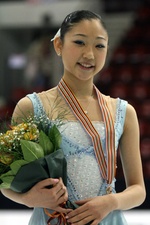
Mirai Nagasu during the medals ceremony at the 2008 World Junior Figure Skating Championships. (Photo: Wikipedia.com)
The following Winter Olympics in 1992, Midori Ito returned to win the silver. But what was more amazing was that the gold that year was won by Japanese American Kristi Yamaguchi. Since then, Japan has become a powerhouse in ladies figure skating, and has recently developed a strong men’s program as well. This year, 16-year-old Mirai Nagasu from Arcadia, California represented the United States. She charmed everyone as she took 4th place, with everyone sure that she will be a medal contender in the 2014 games in Sochi.
It’s been exciting for me to see the growing participation of Japanese American athletes. In these Olympic Games, in addition to Nagasu, there was, of course, Apolo Anton Ohno in short-track speed skating, but also Graham Watanabe in snowboarding.
In general, I find that I root for athletes in this order: Japanese American U.S. athletes, Asian American U.S. athletes, other U.S. athletes, followed closely by Japanese athletes and other Nikkei athletes. Prior to the Olympics commencement, I will even start checking the teams to see if there will be any JA athletes competing so that I’ll know to pay particular attention to those sports.
At least, for me, I realize this prioritization of my loyalties is a reflection of my sense of identity. For me, I am first Japanese American, then Nikkei, Asian American, American, Japanese. I realize this order doesn’t directly correspond to my fan list, but it IS the Olympics, which is about national representation.
Of course, the formula gets a little confused when you add in cases like the Reed siblings in ice dancing who are JA Hapa from the U.S. but competed for Japan (Cathy and Chris) and Georgia (Allison) in order to compete in these Olympic Games. There was also the case of Yuko Kavaguti and her ice-dancing partner Aleksandr Smirnov who skated for Russia. Kavaguti moved and became a Russian citizen (also changed the spelling of her name from Kawaguchi) in order to fulfill her dreams.
I started following Apolo Anton Ohno on Twitter (@ApoloOhno) at the beginning of the Olympics, and his upbeat and enthusiastic postings have been inspiring. Not only does he place the emphasis on the journey rather of the color of his medals, he is also taking the time to enjoy the experience with family and friends, and cheering on his fellow Olympians. Work hard, sacrifice, and give it all you have so that you can live with no regrets, but also take time to enjoy life and support those around you. These messages are strong messages, and make him a good role model. They also remind me of the lessons of the Issei.
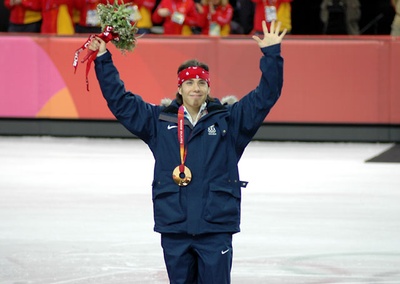
Apolo Anton Ohno at the Short track speed skating at the 2006 Winter Olympics. (Photo: Wikipedia.com)
So, congratulations to all the athletes of the 2010 Vancouver Olympic Games!...but thanks especially to the Nikkei athletes, for the dreams and inspirations for the millions of Nikkei around the world. Otsukaresama desu!
© 2010 Vicky Murakami-Tsuda


